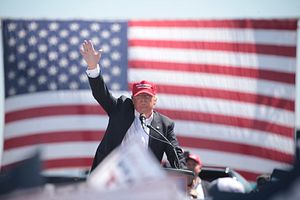In the opening essay to Human Rights Watch’s World Report 2017, Kenneth Roth, the group’s executive director, defines human rights in the most basic of terms — “Human rights exist to protect people from government abuse and neglect” — and laments the rise of populist politicians around the world who have turned the tables, recasting rights as a kind of burden, “an impediment to their conception of the majority will” and “a needless obstacle.”
This may be a new (or rather, renewed) phenomenon in the West, but elsewhere — for both legitimate and ridiculous reasons — “human rights” have nearly always been cast as a Western import and further, as an undermining of unity, harmony, and state security. This casting is done by governments that would likely relish the “populist” label for the inherent popularity the word suggests.
Populism and authoritarianism seem, in a strictly linguistic sense, to be quite different things; but the line between the two blurs as time goes on. What happens when the populists are no longer popular? The clever ones will always be able to brand themselves as popular — deflecting criticisms for their inability to deliver prosperity onto other sources such as “the West,” journalists, rights advocates, immigrants, terrorists, homosexuals, and so on — and thus an authoritarian state can be born quietly, creeping like a mold from a damp corner.
Thomas Pepinsky, associate professor of government at Cornell University, made such a case recently in a piece for Vox. The title (“Life in authoritarian states is mostly boring and tolerable”) belies the real message:
It is possible to read what I’ve written here as a defense of authoritarianism, or as a dismissal of democracy. But my message is the exact opposite. The fantasy of authoritarianism distracts Americans from the mundane ways in which the mechanisms of political competition and checks and balances can erode.
Earlier in the piece Pepinsky wrote, “You know that you are no longer living in a democracy because the elections in which you are participating no longer can yield political change.” The withering of the democratic vine begins earlier than a sham election, but the point remains a good one in identifying a major difference between life in an autocracy and a democracy.
Frequent readers of Crossroads Asia — where I do most of my writing — will recognize this distinction immediately. I’ve written a dozen articles on Central Asian elections over the past two years and cannot hide fully an undertone of cynicism about them. I cover these “elections” because they happen, but most of them are meaningless plays, a staged simulacrum of democracy.
As the Central Asia and U.S. stories I read increasingly converge in tenor and tone (what is said, and how it is said), it’s tempting to compare them. At the outset the two seem to have similar but mirrored problems. Both are fighting the accumulated weight of history, tradition, and their own imperfect existing systems.
One facet the two have in common is that people increasingly feel dissatisfied with the status quo. Roth puts it thusly with regard to the West:
The appeal of the populists has grown with mounting public discontent over the status quo. In the West, many people feel left behind by technological change, the global economy, and growing inequality. Horrific incidents of terrorism generate apprehension and fear. Some are uneasy with societies that have become more ethnically, religiously, and racially diverse. There is an increasing sense that governments and the elite ignore public concerns
The same is true of Central Asia, after a fashion. Public discontent — expressed, for example, in the protests last spring in Kazakhstan — is easily silenced, even more so because the regional press has long been suppressed. But the unease with change and the unfamiliar exists in Central Asia as it does anywhere else. Roth writes, “It is perhaps human nature that it is harder to identify with people who differ from oneself, and easier to accept violation of their rights.”
Discontent in the West is manifesting itself in a turn to populism, and in a way, authoritarianism. “In me,” the populist declares, “you’ll find the solution to all your ills.” President-elect Donald Trump’s promise to “Make America Great Again” fits this format.
In Central Asia, where most of the states (Kyrgyzstan gets a conditional pass) are led by authoritarian governments, discontent still exists but without clear outlets like elections to manifest itself in meaningful governmental change. This is hardly a preferable state. Most discussions in the West about Central Asia mention, at one point or another, regional “instability” and the ever-terrifying specter of terrorism — and while I may mock the hyperbole, a kernel of truth remains that the region has the smell of a powderkeg, at times. Because opposition and discontent are kept below the surface of polite public discourse, figuring out what’s going on is half prophecy. The region’s leaders strive to embody themselves as the only men for the job, sprouting platitudes about harmony and unity, while jailing those who dissent.
If rights are viewed by leaders as “an impediment to their conception of the majority will” — as something engineered by a nefarious “other” to undermine unity and prosperity — then what space is there to dissent? No leader, so far, has ever managed to fix everything, perfectly, for everyone. Discontent will not disappear, but dissent may become dangerous.

































